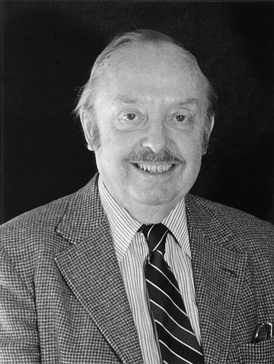Keith R. Porter
Keith R. Porter (1912–1997) was a pioneering cell biologist whose contributions to the field of cell biology and microscopy have been foundational in understanding cell structure and function. His work is particularly noted for the development of the electron microscope as a tool in biological research, which revolutionized the way scientists could study cells at the molecular level.
Early Life and Education[edit | edit source]
Keith Roberts Porter was born in 1912 in Yarmouth, Nova Scotia, Canada. He pursued his undergraduate studies in zoology at Acadia University, where he developed an interest in cell structure and function. Following his graduation, Porter furthered his education at Harvard University, where he earned his Ph.D. in biology. His doctoral research focused on the cell biology of the Mexican axolotl, a type of salamander, which laid the groundwork for his future contributions to cell biology.
Career and Contributions[edit | edit source]
After completing his Ph.D., Porter joined the faculty at Rockefeller University, where he began his groundbreaking work in electron microscopy. In the 1940s, electron microscopes were primarily used for materials science, but Porter envisioned their potential in biological research. His work led to the first electron micrograph of a whole cell, which provided unprecedented insights into the cell's ultrastructure.
Porter's research was instrumental in identifying and describing several key cellular components, including the endoplasmic reticulum, which he first observed in 1945. This discovery was pivotal in understanding the complex internal organization of cells and their functions. He also contributed to the identification of the Golgi apparatus, mitochondria, and the cell membrane, further elucidating the intricate workings of the cell.
Throughout his career, Porter held several prestigious positions, including serving as the president of the American Society for Cell Biology and receiving numerous awards for his contributions to science, such as the National Medal of Science.
Legacy[edit | edit source]
Keith R. Porter is remembered as a pioneer in cell biology and microscopy. His work laid the foundation for modern cell biology, enabling scientists to explore the cell's structure and function at a molecular level. The Keith R. Porter Endowment for Cell Biology was established to honor his legacy, supporting research and education in cell biology.
Porter's dedication to advancing cell biology and his innovative use of electron microscopy have left an indelible mark on the scientific community. His discoveries have paved the way for numerous advancements in biology and medicine, making him one of the most influential cell biologists of the 20th century.
Search WikiMD
Ad.Tired of being Overweight? Try W8MD's physician weight loss program.
Semaglutide (Ozempic / Wegovy and Tirzepatide (Mounjaro / Zepbound) available.
Advertise on WikiMD
|
WikiMD's Wellness Encyclopedia |
| Let Food Be Thy Medicine Medicine Thy Food - Hippocrates |
Translate this page: - East Asian
中文,
日本,
한국어,
South Asian
हिन्दी,
தமிழ்,
తెలుగు,
Urdu,
ಕನ್ನಡ,
Southeast Asian
Indonesian,
Vietnamese,
Thai,
မြန်မာဘာသာ,
বাংলা
European
español,
Deutsch,
français,
Greek,
português do Brasil,
polski,
română,
русский,
Nederlands,
norsk,
svenska,
suomi,
Italian
Middle Eastern & African
عربى,
Turkish,
Persian,
Hebrew,
Afrikaans,
isiZulu,
Kiswahili,
Other
Bulgarian,
Hungarian,
Czech,
Swedish,
മലയാളം,
मराठी,
ਪੰਜਾਬੀ,
ગુજરાતી,
Portuguese,
Ukrainian
Medical Disclaimer: WikiMD is not a substitute for professional medical advice. The information on WikiMD is provided as an information resource only, may be incorrect, outdated or misleading, and is not to be used or relied on for any diagnostic or treatment purposes. Please consult your health care provider before making any healthcare decisions or for guidance about a specific medical condition. WikiMD expressly disclaims responsibility, and shall have no liability, for any damages, loss, injury, or liability whatsoever suffered as a result of your reliance on the information contained in this site. By visiting this site you agree to the foregoing terms and conditions, which may from time to time be changed or supplemented by WikiMD. If you do not agree to the foregoing terms and conditions, you should not enter or use this site. See full disclaimer.
Credits:Most images are courtesy of Wikimedia commons, and templates Wikipedia, licensed under CC BY SA or similar.
Contributors: Prab R. Tumpati, MD

